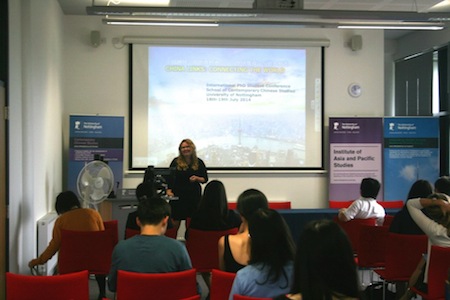
August 5, 2014, by Katharine Adeney
China Links: Connecting the World
With the generous support of IAPS, IGS and the School of Contemporary Chinese Studies, the international PhD Conference ‘China Links: Connecting the World’ was held in the School of Contemporary Chinese Studies on 18-19 July 2014. The conference sought to promote an interdisciplinary and multidisciplinary dialogue on the various transnational linkages of China throughout its long history as well as in its current economic, financial and political interactions with the rest of the world and was very successful in this respect. The insightful papers presented contributed to the discourse and both delegates and non-presenting attendees enhanced their understanding of China’s global linkages as well as enhancing their own international academic networks.
Just as the School of Contemporary Chinese studies links researchers from different disciplines by their common interest in China, so our conference also created a forum for PhD candidates from various fields to share and debate their research and understanding of China, connecting this knowledge to enhance and at times question what we think we know about the PRC and how we should conduct research in the field.
The two fantastic keynote speeches by Professor Henrietta Harrison, University of Oxford, and Dr David Kerr, University of Durham, connected to the topic of the conference by looking into the historical and contemporary linkages of China and the West. Professor Harrison’s talk on “The Choice of Interpreters for the Macartney Embassy of 1793: Life Stories, Fidelity and the Changing Nature of Knowledge” explored one of the first modern diplomatic interactions between China and Europe, highlighting the importance of language and trust for mutual understanding as well as the significance of those individuals who mediate between cultures and languages. Taking us into the contemporary era, Dr Kerr’s speech on “China’s New Geopolitics: patterns, ambitions, and risks” highlighted the PRC’s intentions and challenges in the 21st Century, showing that although China is now more integrated in global politics, it is still trying to find its proper place in the geopolitics of today’s world.
Over the course of the two days of the conference, 18 papers were presented by aspiring young researchers from institutions in the UK, Italy, Germany, Finland, Hong Kong, Canada, Japan, China and Taiwan. In total, the conference had 35 registered participants. These papers were presented and discussed in the following panels: ‘China’s Diplomacy and Global Strategy’ (chaired by Professor Steve Tsang), ‘Investment, Migration and Urban Poverty’ (chaired by Professor Stephen Morgan), ‘Educational and Ideological Exchange: China and the World Since the 1960s’ (chaired by Dr Jeremy Taylor), ‘China’s International Financial and Economic Policies’ (chaired by Dr Jing Zhang), ‘Linking China and the West Before 1949: Reflections on Science, Business, Religion and Education’ (chaired by Dr Niv Horesh), ‘Trust in China’s Bilateral Relations’ (chaired by Professor Steve Tsang), and ‘News Media and Entertainment: Transnational Perceptions and Representations’ (chaired by Dr Xiaoling Zhang).
To ensure that the networks of knowledge created via this conference do not end with our closing remarks, we are using social media to create a continuing forum for exchange of ideas, research and networking.
We intend for this conference to become an annual event at the SCCS and provide more opportunities for PhD students to share their experiences of doing research on and in China and to communicate their findings and thoughts to people from different disciplines, institutions and cultural backgrounds.
Finally, we would like to thank the academic and administration staff of the SCCS, IAPS and IGS who offered invaluable support in the run up to and throughout the conference.
Sabine Stieber, Shaoyu Zhao, Rebecca Scott, Gareth Shaw, Zhe Liang
No comments yet, fill out a comment to be the first

Leave a Reply